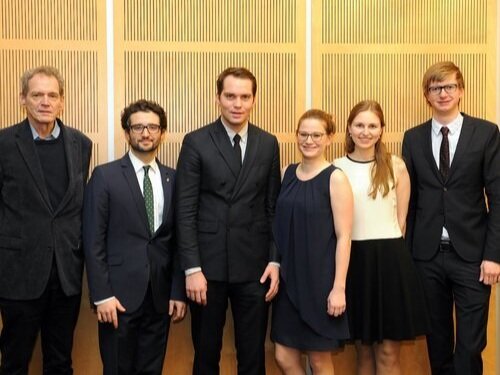Obermayer German Jewish History Award
Günter Heidt
Konz, Rhineland-Palatinate
His first encounter with a Jew who had fled Nazi Germany left a deep impression on Günter Heidt. Researching the Jewish history of the Saar-Mosel region, the teacher and deputy headmaster from Trier came across the story of Jewish survivor René Kahn. Heidt found the emigrant's address in Lyon, specifically planned a vacation in France, and arranged a meeting. "Kahn entered the café, hugged me, and proclaimed with a sigh, 'Ah, someone from my hometown!'" Heidt, still moved by this event, remembers. "Moments like this have been the magical moments of my existence—when people, who once endured so much, have welcomed me so openly."
Since then, Heidt has established numerous contacts with former Jewish residents and their descendants living in France, Israel, United States, Brazil, and Luxemburg. He has interviewed them and invited them for visits to their ancestral home. Through his research, publishing, and guided tours, he has helped to keep the German-Jewish history of the region alive for a quarter of a century. Most importantly, as a teacher, he has also acquainted hundreds of students with Jewish life. "At first, it was the curiosity and the desire not to forget the past that drove my interest," Heidt explains. "Eventually, the more Jewish people I met and the more stories I heard, the more it changed into an affair of the heart."
Not from his parents, nor in public school, nor at university did Heidt learn enough about the Nazi era to satisfy his curiosity. When he became a teacher at the Saarburg high school, near Trier, he grasped an opportunity to correct this for his students. In 1980, a nationwide essay contest for students was announced, on everyday life during National Socialism. Heidt had his students write about the persecution of Jews in the Saarburg region. Heidt helped his history students interview elderly villagers, witnesses to the events, in search of the fate of its local Jewish families.
Since then, Heidt has inspired and supported many students in special research/interview workshops on the subject of German Jewish history. Their efforts have led to new research, numerous publications, exhibitions, and a memorial for the Jewish population once living in the small village of Freudenberg. Repeatedly, his students have received awards in the student German history contest, "Schuelerwettbewerb Deutsche Geschichte um den Preis des Bundespraesidenten", sponsored by the federal government. Heidt, himself, has been honored for this work by the president of Germany.
"The most impressive thing about Guenter Heidt is his enthusiasm which in turn inspires his students," says Susanne Zehren, a former participant in Heidt's history workshops. She thinks of him as the ideal teacher, a cordial man who distributes candy before exams, takes students out for dinner in his spare time, and gives them special attention when they need it. Heidt has also inspired some of his students to continue their work, even after graduation. Research with his former student Dirk S. Lennartz has resulted in six publications on German-Jewish history, the most important of which is "Fast vergessene Zeugen" (Almost Forgotten Witnesses), a history of Jews in the Saar-Mosel region from 1341 to 1943.
Looking to the present, Heidt has also set up an Israeli study workshop and organizes exchanges for his students with a Christian-Arabic school in Nazareth, raising all the funds himself. This year, the exchange is being extended to another Israeli school, this time a Jewish one, in West Jerusalem. Heidt sums up his philosophy of education in this way: "The meaning of teaching for me is to impart the following to my students: Don't be misled by ideologies that make you see the enemy rather than the human being; think for yourself; and live what you are."
Not only students hold Heidt in high regard. "In the Jewish community of Trier, he has always been very much esteemed," says the community's former chair Gerd Voremberg. Since the1990s, when an influx of Jewish immigrants from Eastern Europe provided a new Jewish community in the region, Heidt has befriended many members, attending synagogue services and Jewish holiday celebrations on a regular basis. He has even taken his students to religious services and on guided tours of the Trier synagogue. Using his connections, he has invited members to talk to his students about Jewish history and culture. Acting as an unofficial liaison, he has helped local schools, church groups, choirs, and other associations visit the synagogue for tours and services, and, most importantly, to connect with the Jewish community. Today the interchange between Jews and Gentiles flows naturally, in large part thanks to Heidt.
With three years left before retirement, Heidt now works with colleagues who will take over his workshops and continue the exchange programs at his school. "I am passing the torch on to the next generation of teachers," he states emphatically. "I want the work to be continued."
THIS WALL BRINGS PEOPLE TOGETHER
Students at this Berlin elementary school, built on the site of a synagogue, have been building a wall for the past two decades. It delivers a powerful message about community.
STUDENTS REACHING STUDENTS
When a handful of ninth graders from Berlin met Rolf Joseph in 2003, they were inspired by his harrowing tales of surviving the Holocaust. So inspired that they wrote a popular book about his life. Today the Joseph Group helps students educate each other on Jewish history.
“I SPEAK FOR THOSE WHO CANNOT SPEAK”
Margot Friedländer’s autobiography details her struggles as a Jew hiding in Berlin during World War II. Now 96, she speaks powerfully about the events that shaped her life and their relevance today.



